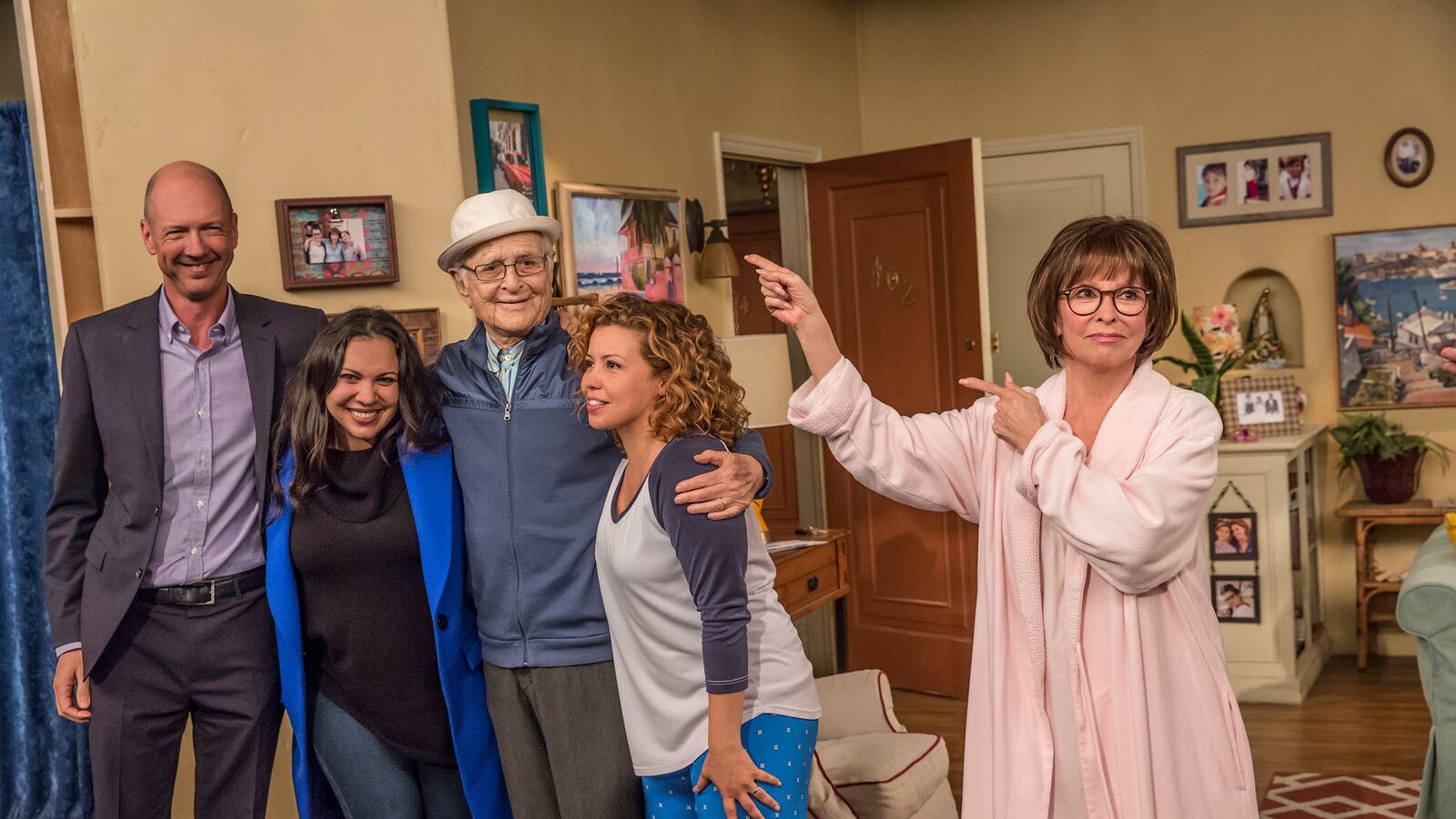Gloria Calderon Kellett is scrolling through pictures of her mother with Rita Moreno on her phone, and she is beside herself. “She looks just like Rita Moreno,” Calderon Kellett, the co-showrunner of Netflix’s revival of Norman Lear’s One Day at a Time, says. “All my life I’ve been saying that! She’s very glamorous. She’s, like, 98 pounds, wet.”
Sitting next to her in a Manhattan hotel room, actress Justina Machado practically hoots with laughter. “Oh my god, I just snorted,” Machado, who plays the female lead in the all-Latino spin on the 1970s sitcom, apologizes. Well, non-apologizes. She’s having too much fun to be truly sorry.
The Rita Moreno iPhone photo slideshow comes as Calderon Kellett is telling, gleefully, the story of her first meeting with Norman Lear about updating One Day at a Time, the Emmy-winning series about a recently divorced mother struggling to raise her kids in changing times.
He told her to just talk about her family, and she mentioned how her mother always reminded her of Moreno. Lear’s bowl-over response: “Oh, I know Rita.”
Months later, Moreno is about to make her debut playing Machado’s mother on the series, and Calderon Kellett is on a press tour gushing over photos of the EGOT-winner and her doppelganger together on her phone: “She’s wigged in this! She has a wig on to look like my mom. That’s my mom, and that’s Rita. Isn’t that crazy?”
It’s a story that bears telling because of the word that comes up time and again as Calderon Kellett, Machado, and I talk about the show, the Norman Lear tradition, and the stories that the Cuban-American Alvarez family are going to tell when One Day at a Time launches on Netflix Friday: “authenticity.”
When Netflix and Lear came to Calderon Kellett about the revival, she said she could only do it if the family was Cuban-American, because that’s her experience. The writers room she ended up hiring is half Latino and half women.
The result is a tenet of a Norman Lear production: a series that lives in the specific stories of a family living in a very specific human condition—in this case, a Latino family raised by a single mother. It’s through that specificity and, of course, humor, that our commonalities as people are exposed, all while we laugh.
Specifically combatting the media’s instinct to brand a show featuring non-white leads as “for” that race or audience, Calderon Kellett says, “Our faces are brown faces. But the things they are going through are universal things.”
Lear’s trailblazing blend of commentary and comedy defined the sitcom genre in the ’70s and ’80s: All in the Family, Sanford and Son, The Jeffersons, Good Times, Maude. His Midas touch mints so much of the new One Day at a Time, which is confident enough to foray into tender, serious, and sincere places; tackle politicized issues, from depression to teenage sex to cultural identity; and have Rita Moreno sing a sexy happy birthday with a broad Cuban accent all at the same time.
In fact, as Variety notes, Lear “reviewed every script, attended run-throughs, and even warmed up the audience before tapings,” vaulting the new One Day at a Time alongside The Carmichael Show among throwback multi-camera sitcoms that, through their commitment to conversation and understanding as much as comedy, are gloriously groundbreaking.
And so with One Day at a Time premiering this week and critical accolades already pouring in, we spoke to an exceptionally energetic Calderon Kellett and her lead, Machado, about reviving Lear’s tradition, why his style of meaningful comedy has been missing, and the significance of telling the story with a Latino cast.
Why is now a good time to bring back a Norman Lear kind of sitcom, but one that he actually did?
Gloria: Look, we need Norman Lear sitcoms on television. Because he talked about stuff in a comedic way. He talked about real issues that were going on. He put the first prosperous African-American family on television. He talked about issues of abortion in this country on his shows. A character of his had an abortion in the ’70s.
Justina: Maude, yeah.
Gloria: I mean the stuff that he was talking about in the ’70s are still so relevant, and yet we moved away from talking about the stuff. I think with what’s going on in this country, especially, it’s a great time to talk about real issues that people are facing, in a comedic way. Which is what we try to do on this show.
I’ve noticed that, too, that the issues we talked about on sitcoms in the ’70s and ’80s are things that in the next few decades were missing. There was this progressiveness, and then it went away. With shows like yours, that ethos is starting to come back again. But why do you think there was that gap for so long?
Justina: I think the only person who really did that was Norman Lear. I’m gonna say this: It’s because he took a break. I really mean that. It’s true if you look at all the other shows—not that there weren’t amazing shows—that were on in the ’80s and the ’90s. That’s his style. It didn’t happen again. So that’s my explanation for it.
Gloria: I think different issues were happening. When our country goes through different things, people gravitate to different kinds of shows. I don’t know if it was because of wartime. I don’t know if it was because, politically, it was a more prosperous time in America. Whatever was going on, people are similarly more politically charged, clearly, in this particular moment in time. So Norman has had a total rebirth, in other shows as well, not just ours. I also think it might be time.
It’s interesting, too, that you’re doing this on Netflix, when we normally associate multi-cam sitcoms and Lear-like shows with network television.
Gloria: Advertisers are needed for network shows. When we were growing up, shows were 26 minutes long with four minutes of advertising. Now it’s 21 minutes of content that you get in 30 minutes. On Netflix we can give you 30 minutes of show. So it can be funny but it can also have plot points and drama. We can give you an emotional range because we have time to do it. Four minutes is a B-story on a sitcom. So when you don’t have that you might be more motivated to do jokes, which I understand. I love traditional sitcoms on networks. It’s just that there’s not a lot of time to really hit a root and make it heartfelt but also be funny in that time frame.
How much of a student were you of the original One Day at a Time?
Gloria: The show premiered in 1975. We were too young to experience the show.
Justina: When I started working on the show is when I visited and started watching it. I was kind of amazed at how many issues [the show dealt with]. Like I saw the heart attack one. (Laughs.) I saw all of these and how they dealt with these. Julie getting her first job, buying her first car. I thought, wow, this was stuff that was really happening then. It was so relevant. And I could see why people were so into it. It was like a slice of life that they could see. And I hope that’s what our show is too for these times.
Gloria: I also think advertisers have become scared of talking about certain issues because they don’t want to upset an American family. I think it’s a shame because there are things we want to talk to our kids about. So to be able to talk about LGBT issues on our show. To be able to to talk about sex on the show. Now if you’re like, “I’m going to do an episode talking to kids about sex,” on a network that’s hard to do! And we get to do that. We get to do that in a real, awkward, great way.
Justina: You can’t even smoke a cigarette on network television anymore. Not that everyone should be smoking cigarettes, but that’s how crazy it’s gotten. You can’t even do things like that that are real-life things.
Gloria: In the first episode [Machado's character] talks about taking antidepressants. Mental issues are often not talked about in a real way on network television, unless you’re a “crazy person.”
Or an everyday way.
Gloria: An everyday way, and have different opinions about that. The traditional experience of her mother that represents older generations in this country. The sort of moderate middle that can see both sides of the issue, and then these children that are growing up, these millennials that have a very different experience with social media and social justice warriors and reading everything and feeling like they are so knowledgeable about what’s going on in the world without any real-world experience. You know?
Justina: That’s so great. That was great. (Laughs)
Gloria: All of that together we get to talk about in way that is organic to this family. So we have a lot of opinions about different issues.
The show is rightfully being celebrated for featuring a Hispanic family. There also tends to be a branding of shows featuring non-white leads as “for” that race. I’ve seen the show and it’s obviously universal…
Justina: THANK YOU!
Gloria: We think so, too.
But when there is that media instinct to segment its appeal or brand it in that way, how do you consider or maybe even combat that—if at all?
Gloria: I think authenticity is everything. When they came to me and said they wanted to do this I said if we’re going to do this it has to be a Cuban family because that’s my experience. I’ve written on other shows where I’ve obviously written for the gamut of human experiences and different ethnicities, but then I have to research the ethnicity. I know what growing up first-generation Cuban American is because I am that. So I can pull on things that are authentic from my life. I think that’s what people want. They want stuff that’s real. So, yes, like you said, our faces are brown faces. But the things they are going through are universal things. So if we deal with that in an organic way to us, we think that is what will translate.
What is the makeup of the writers room?
Gloria: Half Latino, which was very important to me.
Justina: And half women.
Gloria: And half women! Which was also important to me, and in TV today just doesn’t exist. And they are powerful women. We have two gay writers, and we’re proud of that. Usually I’m like, “I’m the one Latino person in the room.” And the lesbian’s like, “Usually I’m the one gay person in the room.” (They both laugh.) So it’s nice that there’s more than one of all of us, and we feel represented.
How did you staff the room?
Gloria: What I’m proud of with that is that [co-writer] Mike Royce and I wanted to get the best writers and we asked for specifically women and Latinos first. But we weren’t like, “We’re going to hire somebody just because their last name’s Gomez.” That’s not the way this is going to roll. We wanted people who were overlooked, but amazing. So we read and read and read and read, and the team we got, we were so fortunate. People look at our room too and were like, “Wow you guys really have everything.” And it changes the conversation in the room. It does. It changes the conversation and the discussion.
Justina: We have young writers, too. Two of them are like 22 or something, which is amazing because it gives great perspective for the Elena character. There are things I’m like, “What the hell?” I barely do social media. So that’s important, too.
The storytelling of being a single mom raising a family, how is it different telling that story in 2016 than when the show aired in the ’70s?
Gloria: Technology. I think technology plays a huge impact in the differences. I didn’t watch a ton of early episodes, just some from season one, and I was struck by things like, just a phone and a cord! I mean now there’s just such a difference in how these kids communicate with each other. Cubans are so hands on, and it’s hard to keep that leash when there are so many variables. We talk about those variables.
Justina: I’m not a mom. But I was raised by a single mom. I don’t know how different it is except for the fact that it’s common now, opposed to before. We have the added technology, but I’m sure it’s all the same struggles and all the same worries. That doesn’t change. Just the times we’re living in changes.
That was the first time we saw a single mom raising a family on TV. Now we’ve seen that story told several times, to the point that an “I don’t know how she does it!” trope birthed from it. How do you, telling this story now, fight against those tropes?
Gloria: For me, I’m a mom and I have two kids. I have family. That’s really important to me. How you do it? You have a lot of help. That’s the reality. Culturally, our families are pretty up in each other’s business.
Justina: The only person who ever took care of me was my grandmother. That’s the only person who ever took care of me growing up. I can’t remember staying with anybody else. That is something that happens on our show, too. Rita, that’s the only person those kids stay with. So, yes, there is a lot of help.
Gloria: [Machado's character] is not just a mom on this show. She’s a woman. She wants love, she wants passion, she wants a better career.
And to take care of herself.
Justina: Don’t you love that? Because it’s always like, she’s just a mom. No, she’s a woman.
Gloria: She’s a full character with flaws and dimension.
Let’s end on the best note: the casting of Rita Moreno.
Gloria: It’s insane. It’s crazy. Listen, when Norman and I sat down he asked me to talk about my family. I told him parents are at my house every day. That’s just true. They have a key. They’re there all the time. They pick up my kids from school. They take them to dance classes. Karate. Everything. He goes, “Tell me about your mom. What does she look like?” I said she’s very glamorous. She looks Rita Moreno. All my life I’ve been saying that! She’s, like, 98 pounds, wet.
Justina: (Laughs.) Oh my god, I just snorted.
Gloria: Glam all the time. Has an outfit on. She’s a woman that cares about the presentation. And Norman was like, “Oh, I know Rita.” The fact that it happened is crazy. I have photos of Rita and mom together I have to show you. She’s wigged in this. She has a wig to look like a mom. Look at this. That’s my mom. And that’s Rita. Isn’t that crazy? Look at that. Look at that lady. Isn’t that insane?
The entrance with the curtain…
Gloria: Listen, you gotta give Rita Moreno an entrance.






